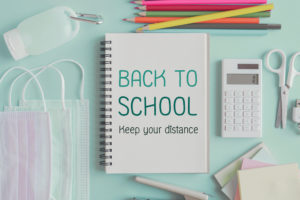Most schoolchildren in England are returning to the classroom this week for the first time since March. Back to school planning always involves an element of stress, particularly for those co-parenting, and this year there’s every chance that will be exacerbated by Covid-19 concerns.
When the Government first announced plans to gradually re-open our schools in June, take up was low. The aim to have all school years back before the summer break was quietly shelved as it became clear that neither schools, nor teachers or parents were convinced the safety risk had sufficiently diminished.
Now, as Covid infection levels are at a lower rate, schools are planning for a full return over the coming days, albeit arrangements for many will look different to what they’ve previously experienced.
Masks are not being recommended for children outside of local lockdown areas. However, pupils will have to get used to year bubbles, frequent hand sanitising, less freedom to move around school and other measures to reduce the risk of infection.
In early summer it was reported some parents were going to court to argue about whether their children should return or not. Now the situation has eased, it is not expected there will be the same level of resistance but it’s understandable that concerns remain.
In co-parenting families, there may be differing views on the right action to take. It is vital that any concerns are aired with the aim of reaching an amicable agreement.
Here are a few things to consider:
Transporting children to and from school, arranging after hours care, and extracurricular activities present challenges for many co-parents. The current situation will only exacerbate that. While after-school activities may be limited right now, many schools will have shorter days and travel arrangements may need re-thinking.
The start of a new school year is the perfect time to update your emergency contact information. Both parents should be listed as emergency contacts with schools. They may need to pass on information quickly in the event of an outbreak.

The return to school will be different for all pupils this year
Schools will be endeavouring to teach all their pupils and students on site. But with the virus still present, there’s the threat of local lockdowns and a return to remote learning. Parents need a plan for what happens in the event there is an outbreak at their child’s school, the child contracts the virus or if either parent does.
With remote learning still a possibility, both parents need to ensure the child has full access to everything they need. Is there a quiet space for them to work? Do they have access to a computer and the internet? Planning for possible additional expense will help ensure your child has the necessary tools to continue their learning successfully.
The most important aspect in all this, of course, is the child’s welfare.
Children have concerns about their safety and that of those they care about. Now is the time to have age-appropriate, honest conversations with them about what to expect.
After months of being mainly at home, many children will be excited about being with their friends again. But a recent survey found that anxiety levels among children actually fell during lockdown, so it’s only natural they may need some reassurance about the return.
It’s a real positive that schools are again able to welcome back children in large numbers. However, the conditions and rituals they are returning to will not be quite the same as they left in March.
Communication between parents is key to easing the return to school. If, for any reason, that cannot be done informally then consider consulting a legal representative to ensure nothing is left to chance.
→ We’ve written previously about helping children with coronavirus anxiety.
→ And here’s the Department for Education guidance on the full re-opening of schools
I WILL BE ETERNALLY GRATEFUL. AMANDA MAKES YOU FEEL LIKE YOU ARE HER ONLY CLIENT AND HOLDS YOUR HAND TO GUIDE YOU THROUGH














